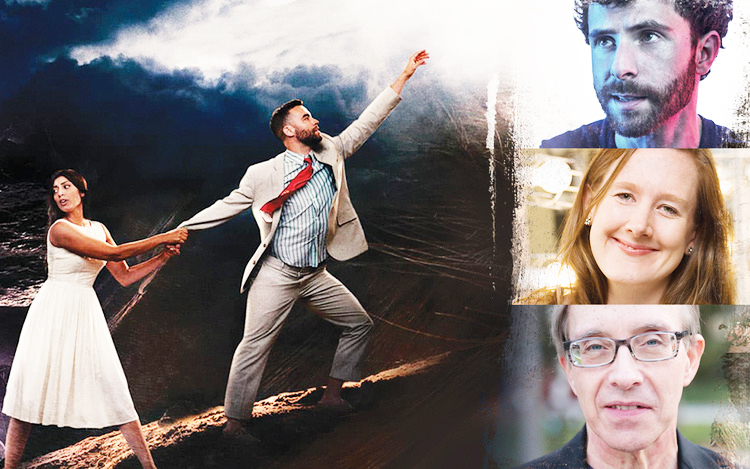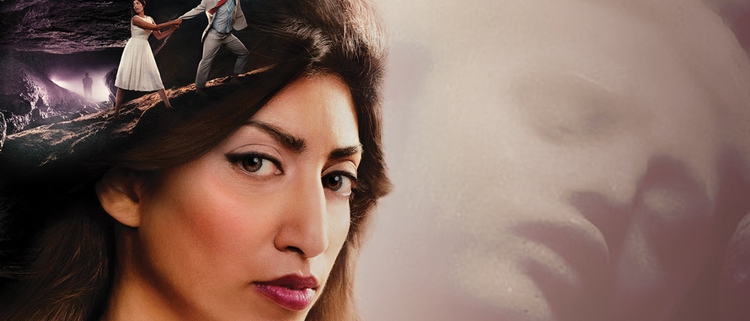Reimagining ‘Eurydice’

The classical Greek tragedy of Orpheus and the lost maiden Eurydice usually follows the hero’s cunning journey into the Underworld, but playwright Sarah Ruhl and composer Matthew Aucoin flipped this script.
Music enthusiasts and opera aficionados filled Bovard Auditorium for “The Life and Afterlife of Eurydice (and Orpheus) in Opera” Thursday to celebrate the debut of the new opera “Eurydice,” which opened at the Los Angeles Opera Feb. 1 and runs through Feb. 23.
This Visions and Voices event is part of a larger “Eurydice Found” arts showcase surrounding the opera’s debut, featuring special performances by singers from L.A. Opera’s Domingo-Colburn-Stein Young Artists Program.
The new opera “Eurydice” focuses on the heroine’s decision to leave the realm of shadows and follow her love back to the world of the living — only to fall back again due to a twist of fate.
Aucoin, who is also an L.A. Opera artist in residence, said that the pair had been working on the piece for more than three years.
“It took me a while to realize this, but this is not really an opera that just tells the story of the myth from the other perspectives,” Aucoin said. “It rather takes the myth as a starting point for meditation on love and loss and memory.”
During the panel, both artists discussed how the creative process of transforming Ruhl’s 2003 play into “Eurydice” felt “seamless.” Aucoin added that opera was the best way to take the story in a new direction.
“That sense of music’s transcendent power that made it so appealing,” Aucoin said. “And I think, ‘OK, well that’s what makes it appealing to music. But what about opera specifically?’ And I think because opera is an art form obsessed with suffering and that kind of cathartic transformation of suffering into pleasure [and] finding that fine line between pain and pleasure.”
Ruhl said he was originally fascinated by the Orphic myth because most of the existing art explored only one side of the story — the male perspective. Ruhl read a portion of the opera during the panel that explores how Eurydice is able to share her love and pain in both of Ruhl’s renditions.
“This is what it is to love an artist” said Ruhl, reading from the opera score. “Inside his head, he is always going away from him. Inside his head, there is something more beautiful … This is what it is to love an artist, this is what it is to love.”
While the opera aims to evoke raw emotion and comment on human imperfection, Ruhl said he was adamant about using humor to counteract suffering in the opera’s score.
“I felt really lucky that Matt had this sneaky way to musicals and humor like finding the rhythm of humor,” Ruhl said. “It was always important to me in the play that any type of grief was getting too soft and too soggy. The stones would come in and be funny. So that the laughter opens you up, in fact, to her grief.”

Joy Zhong, a sophomore majoring in philosophy, said they enjoyed the panel because it introduced them to a larger conversation about Greek mythology and its intersection with classical music.
“I don’t have the most educated ears in opera,” Zhong said. “But I’m really interested in Greek mythology, Greek classics and plays and Wagner but all those things [Ruhl] referenced that I didn’t get inspire me to look more into it.”
Elizabeth Nguyen, a sophomore majoring in biochemistry, said the panel discussion was interesting because the opera transfers ancient Greek myths to the current era.
“I thought it was really interesting to see the behind-the-scenes of the event, like where it comes from and then also their different interpretation of the story of Orpheus, like rather than from Orpheus’ perspective, it was more about Eurydice,” Nguyen said. “I thought it was really interesting how they pulled out the aspect of her with her father … I feel like that really resonates with a lot of people. Everyone [has] experienced, some type of loss and [ask], ‘If I only have one more day to talk to them,’ or something, So I thought that was pretty cool.”
The intersection of modern activity and otherworldly repercussions make “Eurydice” an opera relevant to audiences of all ages, said Stacy Brightman, the vice president for Education & Community Engagement at L.A. Opera.
“This is an opera that’s about to manage the dimension of both worlds, you know, life and death and it’s also about something I think every single one of us has experienced no matter what your nationality, no matter what your age,” Brightman said. “One of the big themes of this is love. What does it mean to love somebody? Would it mean to lose somebody? And what does it mean to intentionally lose somebody?”
Students who do not have the chance to see the opera in person can attend one of the many art events surrounding the “Eurydice” world premiere, such as a performance by musicians from L.A. Opera at the USC Brain and Creativity Institute Feb 6. Brightman, who is in charge of organizing the L.A. Opera’s “Eurydice Found” Festival, said that the festivals bring community members together to explore different facets of the tragic and often one-sided myth.
“And so it really is something that demands some investigation, some thought,” Brightman said. “[It is] the opportunity to — and this is what I love about our festivals is the way we do this — honestly it’s about going out to other experts and thinkers and artists around Los Angeles and asking them, ‘Why do you think this myth endures? Why do you think the story of Eurydice is important now?’ And really, people sharing ownership of the entire experience.”

